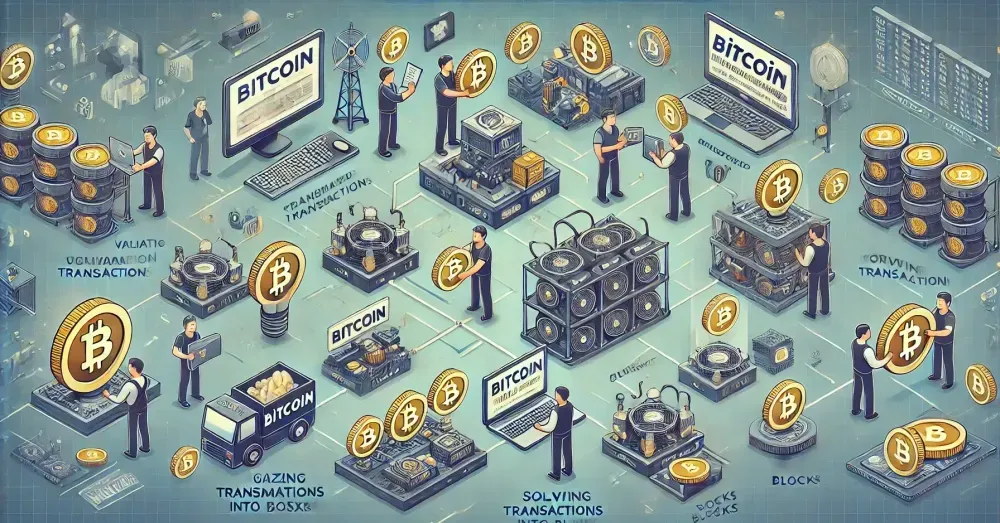Confirmation in Bitcoin Transactions and the Role of Miners

In the Bitcoin system, a transaction is not completed the moment someone sends Bitcoin. A Bitcoin transaction must go through a process called confirmation to be considered valid and secure. Confirmation is a crucial step that ensures the transaction can be trusted and accepted by the entire network. This article will explain what confirmation is, why it is important, and the essential role miners play in the confirmation process.
What is Confirmation in Bitcoin Transactions?
When someone sends Bitcoin, the transaction does not immediately settle like a bank transfer would. Bitcoin transactions require confirmation from the network to be recognized as legitimate.
Simply put, confirmation is the process by which a transaction is added to a newly mined block on the blockchain, Bitcoin’s permanent public ledger. Every time a transaction is included in a block, it receives one confirmation. Each additional block added on top of it increases the transaction’s confirmation count.
Why is confirmation important?
- Prevents Double Spending: Confirmation helps prevent someone from spending the same Bitcoin more than once. In other words, once a transaction is confirmed, it cannot be duplicated or reused.
- Ensures Transaction Security: Each additional confirmation makes a transaction harder to reverse or tamper with. The more confirmations, the more secure the transaction.
The number of confirmations required to verify a transaction varies based on the transaction’s size and the security requirements. For instance:
- Small transactions typically need only 1–3 confirmations.
- Large transactions, such as those on exchanges, usually require 6 or more confirmations for enhanced security.
The Role of Miners in Transaction Confirmation
Miners are essential in the confirmation process. Through mining activities, they ensure that every transaction on the Bitcoin network is verified and properly recorded. Here is a breakdown of miners’ key roles in the confirmation process:
1. Validating Transactions
When a transaction is broadcast to the network, all Bitcoin nodes (including miners) receive information about it. Miners validate the transaction to ensure the sender has enough Bitcoin to complete the transaction and that there is no double-spending attempt.
2. Organizing Transactions into a Block
Once a transaction is considered valid, miners collect it along with other valid transactions and organize them into a block. Each block contains a list of unconfirmed transactions, and miners compete to solve this block.
3. Solving the Cryptographic Puzzle (Proof of Work)
To add a block to the blockchain, miners must solve a complex cryptographic puzzle. This puzzle is part of the Proof of Work (PoW) consensus mechanism, which ensures that only miners who expend resources (in the form of electricity and computing power) can add new blocks. This process is known as Bitcoin mining.
4. Including Transactions in the Blockchain
Once a miner solves the puzzle, they can add the new block to the blockchain, giving all transactions in that block one confirmation. The miner who successfully mines the block also receives a reward in newly created Bitcoin, along with transaction fees from the transactions in the block.
5. Increasing the Confirmation Count
Each time a new block is added on top of the block containing a transaction, that transaction gains an additional confirmation. These added blocks act as extra layers of security, making the transaction more challenging to alter or reverse.
In other words, the more blocks added on top of the initial block, the higher the transaction’s confirmation count and the more secure it becomes.
The Importance of Confirmation for Bitcoin Network Security
Confirmation is not just an administrative process; it is a critical mechanism for maintaining the security and integrity of the Bitcoin network. Here are some reasons why confirmation is vital for the network:
- Reduces Fraud Risk: Each new confirmation makes a transaction increasingly difficult to reverse or alter. This helps prevent double-spending attacks.
- Strengthens Network Consensus: With each block added to the blockchain, consensus is reinforced, helping the network remain decentralized and secure.
- Incentivizes Miners: The confirmation system incentivizes miners to keep participating in the network. Block rewards and transaction fees motivate miners to support network security through mining activities.
Conclusion
Confirmation is a fundamental part of the Bitcoin transaction process. Without confirmation, there would be no way to ensure the legitimacy and security of transactions on the network. Miners play a crucial role in this confirmation process, validating transactions, adding them to the blockchain, and securing them through the Proof of Work mechanism.
Ultimately, every confirmation by miners strengthens the network and increases users’ trust in Bitcoin as a secure and transparent payment system. This process allows Bitcoin to remain decentralized and free from third-party control while ensuring the integrity of transactions occurring within the network.
This article presented by Loka Mining.
Loka is revolutionizing the Bitcoin mining ecosystem by directly connecting investors with Bitcoin miners through a decentralized mining pool and an upcoming permissionless forward hashrate marketplace protocol.
Loka enables investors to get Bitcoin at lower than market price without centralized & counter-party risks, and Bitcoin miners to access capital efficient financing and hedge their risk exposure by selling their future mining rewards.
Find out more about loka in https://lokamining.com — or access our mining pool aggregator on https://pool.lokamining.com
